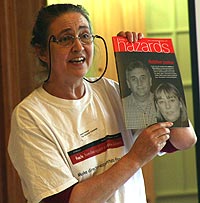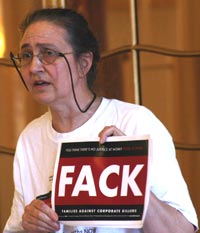 |
 |
|
HSE's official figures relating to workers deaths and injury at work have once again been criticised as being inaccurate and too conservative, during a conference on The Quality of Working Life: Promoting a Healthy Agenda held in Liverpool's Adelphi Hotel last week. The conference organised by the Institute of Employment Rights asked whether or not it is time to examine current health and safety legislation, arguing that a quality of working-life focus could include work/life balance, flexibility, hours and holidays, job security and more.
Detailing the work done by the national campaigning group Hazards, she provided worker deaths and injury statistics used by the organisation, stating that they are more accurate than those of the HSE and take into account factors that the HSE fail to include. Reiterating the message given on the Hazards Campaign website, Hilda advised those attending the conference that it is estimated that every year 1,600 to 1,700 people die in incidents at work with up to 50,000 people dieing due to work-related illnesses. The Hazards Campaign website provides these alarming facts she said: "The HSE headline figure is that 241 were killed by work in 2006/07 but this only refers to workers (employees, 185, and the self employed, 56 ) killed in incidents reported to HSE. It does not include members of the public (369), those killed in work-related road traffic incidents (over 1,000) or in the seas around the coast (about 30). Neither does it include those killed by illnesses caused by work and so is a gross underestimation. Figures for the current year 2006/07 are much worse than for 2005/06. Construction fatalities were up from 60 in 05/06 to 77, a rise of around 30%. UCATT, PCS and Prospect trade unions link the rise in death to cuts in resources available to the HSE. The number of HSE inspections, Improvement and Prohibition Notices, safety prosecutions and convictions and inspector contact times have all dropped markedly in recent years, though they have risen a little from this low lately." The guest speakers on the tope table, including John McDonnell MP, and Professor Steve Tombs, Liverpool John Moores University, nodded in agreement during her presentation, which was enthusiastically applauded by the conference.
"FACK is a group of families angry and frustrated as employers seem to be getting away with murder. The pressure group intends to give a voice to those who pay the price for employers negligence - the people killed and their families - to equal the voice of the employers and business in shaping policy on health and safety." Reminding the conference that The Corporate Manslaughter Bill passed by the government in .July 2007 IS NOT an effective law when it comes to the death of workers at work, she listed the following amongst the aims of FACK:
Hilda attacked company bosses who simply fail to care about their workforce, get fined inadequately when one of their employees is killed at work, close down the business in order to avoid any payment of fines and then simply trade as a different organisation. Concluding her presentation, Hilda once again commented on the statistics relating to workers death and injury in Britain: "I hate the use of the term accident when it comes to talking about workplace deaths and injuries. An accident is an incident that occurs that no one can do anything about, but the incidents resulting in workers deaths could be completely avoided if Companies obeyed health and safety law. Let's stop calling them accidents but negligent acts by companies who don't care about their workforce. These are simply criminal acts!" Related news items: Guilty of Corporate Manslaughter - Fined £2! & Vigil for Zbigniew Swirzynski Killed At Work The Institute of Employment Rights Source: Hazards / FACK / Unionsafety
|
 In challenging the HSE official figures and calling for the Trade Union movement to use figures which were far more accurate, Hilda Palmer from Hazards Campaign gave a presentation on the work of both Hazards and the recently formed Families Against Corporate Killers.
In challenging the HSE official figures and calling for the Trade Union movement to use figures which were far more accurate, Hilda Palmer from Hazards Campaign gave a presentation on the work of both Hazards and the recently formed Families Against Corporate Killers.  Turning to the recently formed campaign group, Families Against Corporate Killers (FACK), Hilda explained to the conference what the group is all about:
Turning to the recently formed campaign group, Families Against Corporate Killers (FACK), Hilda explained to the conference what the group is all about: